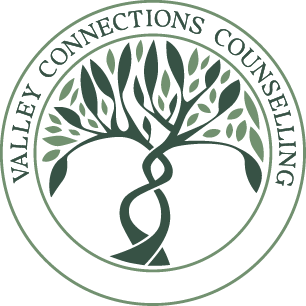
Valley Connections Counselling offers support for the whole family.
What is Family Therapy and how can it help your family?
Family therapy can be particularly helpful for several reasons:
1. Change the way you see your family dynamics: Family therapy views the family as a system where each member affects and is affected by the others. This perspective helps to understand the dynamics and patterns that contribute to problems and enables interventions that address these interactions.
2. Improve Communication: Therapy sessions often focus on enhancing communication skills among family members. This can lead to more effective and open dialogues, reducing misunderstandings and conflicts.
3. Learn Conflict Resolution Skills: Therapists help families identify the root causes of conflicts and develop strategies to resolve them constructively. This can lead to a more harmonious and supportive home environment.
4. Strengthening Your Relationships: Family therapy aims to build stronger emotional bonds and improve relationships. It can help family members develop empathy, understanding, and trust, which are crucial for healthy relationships.
5. Support for Individual Members of Your Family: Family therapy can provide support to individual family members dealing with specific issues, such as mental health challenges, behavioral problems, or trauma. The family can learn how to support the individual effectively while maintaining their own well-being.
6. Addressing Behavioural Issues: For families with children or adolescents exhibiting problematic behaviours, family therapy can be instrumental in identifying underlying issues and developing effective parenting strategies and interventions.
7. Increase Resilience for Coping with Major Life Changes: Family therapy can help families navigate significant life changes, such as divorce, illness, loss, or relocation. It provides a space to process these changes and develop adaptive coping mechanisms.
8. Unlearn Unhealthy Patterns: Families can develop dysfunctional patterns over time that contribute to ongoing issues. Family therapy helps identify and break these patterns, promoting healthier interactions and relationships.
9. Address Issues in Your Home Holistically: By involving all family members, therapy can address issues in a comprehensive manner. This holistic approach can sometimes lead to more sustainable and meaningful changes than individual therapy alone.
10. Move toward feeling Empowered Empowerment and Resilent: Family therapy empowers families to find their own solutions and build resilience. It fosters a sense of collective strength and competence, helping families to navigate future challenges more effectively. Overall, family therapy can create a supportive environment where families can work together to understand and address their issues, leading to healthier and more fulfilling relationships.
What type Family Therapy does Valley Connections Counselling Offer?
One of our therapists with ten years of experience, Kaitlyn Evans, is a Registered Psychotherapist who is trained in Emotion-Focused Family Therapy (EFFT). EFFT is a therapeutic approach designed to help families navigate and resolve emotional and relational issues. It is grounded in the principles of Emotion-Focused Therapy (EFT), which emphasizes the importance of emotions in human functioning and relationships. EFFT specifically applies these principles to the family context, aiming to improve family dynamics and individual well-being through the exploration and processing of emotions.
Key components of EFFT include:
1. Increasing Emotion Awareness: Helping family members become more aware of their own and each other’s emotions. This includes identifying and articulating feelings that may have been previously unrecognized or unexpressed.
2. Providing Opportunities for Emotional Expression: Encouraging the open expression of emotions within the family. This can involve sharing feelings in a supportive and non-judgmental environment, which can lead to greater understanding and empathy among family members.
3. Increasing Emotion Regulation: Teaching family members skills to manage and regulate their emotions effectively. This can help reduce emotional reactivity and improve communication and problem-solving within the family.
4. Focus on Attachment and Bonding: Strengthening emotional bonds and attachment relationships within the family. EFFT focuses on creating secure, supportive connections that can foster resilience and emotional well-being.
5. Restructuring Interactions: Changing negative or maladaptive interaction patterns within the family. This can involve addressing conflicts, improving communication, and developing healthier ways of relating to one another. EFFT is often used to address a wide range of family issues, including those related to mental health, behavioral problems, trauma, and relationship conflicts. It can be particularly effective in helping families support a member dealing with emotional or psychological challenges, such as depression, anxiety, or eating disorders.
Overall, EFFT aims to create a safe and supportive environment where family members can work together to understand and address their issues, leading to healthier and more fulfilling relationships.
